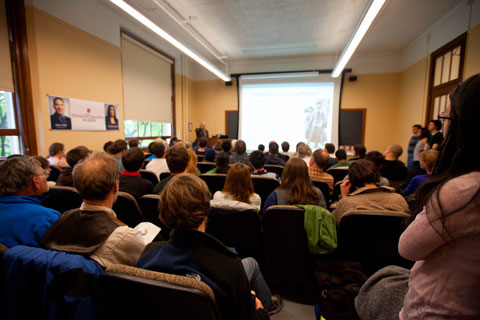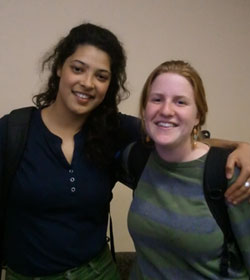David North speaks in defense of Leon Trotsky at Cornell University
By Tom Mackaman
3 May 2012
 The meeting at Cornell University
The meeting at Cornell UniversityOn May 1, David North, national chairman of the Socialist Equality Party and international editor of the World Socialist Web Site, spoke at Cornell University, in Ithaca, New York, in defense of Leon Trotsky. The event was hosted by the Cornell chapter of the International Students for Social Equality.
An overflow crowd of about 100 people attended. Many sat on the floor or stood throughout the presentation and discussion, which lasted for two hours. Among those in attendance were undergraduate and graduate students, international students, local and retired workers, and professors from Cornell and nearby Ithaca College and Binghamton University.
North began his remarks by asking why a meeting would be held “in defense” of Leon Trotsky. A discussion on Franklin Delano Roosevelt or John F. Kennedy, he pointed out, would not be presented in such a way. The answer, North said, is because Trotsky remains a very contemporary figure whose political thought speaks directly to the current global capitalist crisis.
It is difficult for historians to approach the subject, North said, because “Speaking about Trotsky indicates not just one’s attitude about the past but about the present.”
North pointed out the context in which the generation that grew to political consciousness in the 1960s came into contact with Trotsky’s writing. Young people then sought and found in Trotsky answers to major historical questions concerning the “maelstrom of politics in the 20th century, including fascism, Stalinism, and the Holocaust.” The question that youth were then asking was, “Was there an alternative to Stalinism?”
In his lecture, North provided an exposition of Trotsky’s remarkable career, including: his first engagement in revolutionary politics at the age of 20; his leadership of the Petrograd Soviet in the 1905 Russian Revolution; his formulation of the Theory of Permanent Revolution; his leadership of the Russian Revolution and the Red Army in the Russian Civil War; his long political struggle against the degeneration of Stalinism and the Third International; his warnings over the rise of Nazism in Germany; and his founding of the Fourth International.
Throughout these biographical remarks, North related Trotsky’s ideas to contemporary problems that youth and workers are confronting—the presidency of Barack Obama and the current US election campaign, the eruption of American militarism, the growth of social inequality, and intellectual decline on college campuses in the form of identity politics and postmodernism. These comments were greeted warmly by the audience.
North raised the question of how Trotsky “lost” power. He said that in many college courses on Soviet history “one gets a narrative like this: Trotsky lost power because Stalin was a better politician.” In fact, North explained, Stalin emerged as a representative of the bureaucracy precisely because of his mediocrity. Trotsky’s actions were always governed by principle, North said. He considered “at every point the impact of his politics on the consciousness of the working class.”
The lecture addressed Stalin’s campaign of lies against Trotsky, which culminated in the physical annihilation of the revolutionary generation in the bloody purges of the late 1930s. North explained that at the root of the political lie are material interests—in this case the demands of the Soviet bureaucracy, represented by Stalin, to defend its wealth and privileges against the revolutionary perspective advanced by Trotsky. Trotsky was the chief defendant in the Moscow Trials, and together with his son Sedov was sentenced to death in absentia.
Seventy-five years ago last month, North pointed out, the eminent American philosopher John Dewey headed up a Commission of Inquiry that studied exhaustively the charges against Trotsky and Sedov, and returned a verdict that found them not guilty and the accusations a frame-up.
The lies against Trotsky have recently been repeated by a trio of British historians. North analyzed the recent Trotsky biographies by Ian Thatcher, Geoffrey Swain, and Robert Service. Citing specific examples from their texts, he demonstrated how they have sought to falsify Trotsky’s history and demean his political thought.
North explained that the recent books defaming Trotsky are examples of preemptive biographies. “We live in an age of preemptive war, why not preemptive biographies?,” he asked. The purpose of these books, most recently a monograph written by Oxford historian Robert Service, is to block youth from finding their way to Trotsky. The academic historians remember and fear the introduction to Trotsky that the generation of the 1960s gained through Isaac Deutscher’s The Prophet trilogy.
North encouraged those present to answer the question for themselves by reading Trotsky’s own works such as The Revolution Betrayed, The History of the Russian Revolution and his autobiography, My Life.
After concluding his remarks North took questions from the audience. One attendee asked whether or not history could be considered a science in the way natural sciences are. North said it is not precisely the same, but that history could be scientific to the extent that its study could provide a means of predicting the course of events. He pointed to the record of Trotsky, who predicted in 1906 the fundamental dynamic of the Russian Revolution, and to the record of the World Socialist Web Site, which over the past decade has predicted the economic collapse and the right-wing character of the Obama administration.
Another audience member said he agreed with the analysis, but he did not see in society artists, musicians, and philosophers who were fighting for revolution or standing for the interests of the working class. North pointed in response to the toxic intellectual climate created on campuses through the promotion of postmodernism and identity politics. The former insists that there is nothing that is knowable, and the latter is an outlook that promotes the material interests of an upper middle class stratum. “The central question is class,” North said. “Who owns the property?... People will find their way to the Russian Revolution.”
After the meeting was formally ended, a number of students and workers stayed on to discuss the talk with members of the ISSE and SEP and to buy autographed copies of North’s book, In Defense of Leon Trotsky. Eighteen copies were sold. A number of audience members also made donations.
A WSWS reporter spoke with audience members after the meeting.
Andrea and Elizabeth are seniors at Cornell in International Agriculture and Natural Resources, respectively.
 Andrea and Elizabeth
Andrea and Elizabeth“It was good to learn about Trotsky’s work,” Andrea said. “It was inspiring to hear about how his ideas are relevant to our current situation, how his foresight can be applied to today’s world. He had a good point about people being frightened of Trotsky’s ideas. Once the ideas are out, you can’t just take them back in.”
Elizabeth added, “It’s nice to go to a talk that’s about analysis and not just academics. Trotsky detailed events during the times they took place. I think right now it’s resonating with people who are dissatisfied with the world.”
Ben, Anne, and Paul are underclassmen studying biology, physics, and math. All three were impressed with “Trotsky’s ability to still be relevant,” in Paul’s words. Anne added that she was struck by Trotsky’s accuracy in predicting world events in the 1920s and 1930s even after he was out of power in the Soviet Union.
Felipe is an international graduate student studying geological science.
“I didn’t know very much about Trotsky,” he said. “I am amazed especially by how he could predict events.”
“The talk gave me some hope I didn’t see before,” he said. “I have been discouraged that we are facing all this inequality. No one represents the masses.
“People are starting to have influence again. I feel I have to be part of this movement. I am ready to work to contribute to a new revolution. Social rights are as important as any other rights.”
André is an ecology professor from Germany.
“I was raised in East Germany,” he said. “I remember as a youth that no mention of Trotsky was ever made. Sometimes his image would appear beside Lenin’s in a textbook, but in the caption they would not include his name.”
“In 1988, right about at the time of the collapse, Trotsky’s name started to came back up, very suddenly. People at the time didn’t have any idea that within one year the GDR [East Germany] would be gone….Trotsky’s ideas today are unbelievably relevant.”





Follow the WSWS